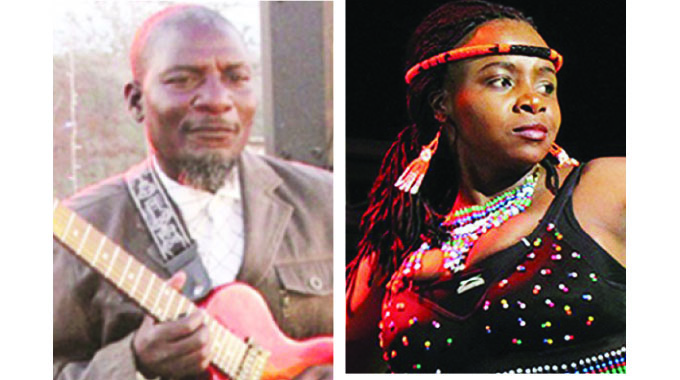Writing runs in this family
Beaven Tapureta Bookshelf
Key local spoken word artist Cynthia Marangwanda, also known as Flowchyld, has published a gripping debut novella titled “Shards” (2014, LAN Readers).
The novella and its author trigger an avalanche of rich links across time, place and generations. My mind could not help swivelling and searching back and forth in time.
Flashback to colonial Zimbabwe: A new Western culture, fronted by missionaries brandishing the Christian Bible, has got the indigenous traditional belief systems by the throat. Young people are losing their roots. Artistes, including Shona black writers, are concerned that soon their traditional identity will be eroded and the only way this can be evaded is by creating songs and stories that “show” the evils of a borrowed foreign culture. Among the writers is John W. Marangwanda, Cynthia’s grandfather.
His iconic Shona novel, “Kumazivandadzoka”, was published in 1959 by the Rhodesia Literature Bureau together with two other books by Solomon Mutswairo and E. M. Ndlovu.
John W. Marangwanda possibly had no idea of the seed of writing he had just planted in the family through his novel.
Many,many years later, his granddaughter is born in Harare. They name her Cynthia.
Cynthia grows just as any other kid but deep in her heart there is an outstanding creative gene.
The past and the present connect as this young and gifted descendent of Marangwanda is launched onto the literary stage.
She soon finds her voice and is determined to use it and her playground is the Book Cafe.
She earns the stage name Flowchyld in the poetry performance circles of Harare, for her poetry flows like a newborn river, softly rubbing the dust off the hard rocks.
Back in the 60s and 70s, “Kumazivandadzoka” was popular with readers when it was published and is one the earliest Shona novels by black Zimbabwean writers.
George Kahari, a prominent academic and critic, aptly describes the novel as “a satirical story and a symbol of systematic destruction of Shona ethical values” (The Rise of the Shona Novel, 1990).
Did John W. Marangwanda know that his deepest concerns with tradition would be prophetic of the current times in Zimbabwe?
Did he know his granddaughter would also feel the pinch of a lost generation? The “destruction of Shona ethical values” which he tackled in his interesting Shona novel is still felt today many years after colonialism was put to rest.
It is interesting to note that “Kumazivandadzoka” is like a seed sown many years ago and now it has sprung up into the unbridled situation portrayed in the author’s grand-daughter’s novella.
Although the two books, “Kumazivandadzoka” and “Shards” are dissimilar in various ways, their concern for “Shona ethical values” is felt in both. “Shards” shakes the mind, splits it into pieces of thought which, like a puzzle, leave the reader wondering how could a society divest itself of its own traditions.
In “Kumazivandadzoka”, Saraoga, the main character, is swallowed by the city which his widowed mother sees as “a creature without a mouth” (G. Kahari, “The Rise of the Shona Novel”). When Saraoga goes to the city, he loses his identity. As for the poetic narrator in “Shards”, the city in which her family has established itself has grown into a foreign beast, devouring all spirituality left in the indigenous belief systems and the narrator is wrestling to win herself, her sanity.
Cynthia’s poetic genius is not detached from her novella “Shards” which she renders in such energetic poetic fiction and vividness that one is drawn back to memories of the late Zimbabwean writers Yvonne Vera and Dambudzo Marechera.
Cynthia does not hide her love for these two legendary writers.
“I consider Marechera and Vera my literary ancestors. I can relate to their style and technique, that highly poetic form of prose of Vera and Marechera and dense stream of consciousness of their narratives and their commitment to their craft,” she says.
“Nehanda”, a novel by Yvonne Vera, has the theme of spirit possession and gives an “alternative history” about the revered Shona spirit medium of Nehanda Nyakasikana. “Shards”, on the other hand, reverberates with just the same theme but in totally different contexts.
In “Shards”, the narrator experiences spiritual visits from her dead Grandmother.
The narrator, a poet, is in a psychic war against the dictates of Western culture which has made her family consider her insane. Her ties with family are broken as she pursues her spiritual grandmother.
Whenever her grandmother appears, dressed in “svikiro” robes, the narrator is possessed and travels in the mind to places the spirit leads her.
On certain visits, the narrator says: “Grandmother would bring me the river – its precious waters contained within her amorphous hands – and I would wade in enthusiastically, ready to soak up its secrets.”
Interestingly, another character named Pan, an artiste also, has moments when he talks to his dead father in quiet meditation.
Asked why she chose this theme of spirituality, writer Cynthia said: “I think traditional spirituality has been unfairly demonised and should be accorded more respect in this modern age.”
But “Shards” is also fictionalised autobiography, just like “House of Hunger” by Dambudzo Marechera whom Cynthia calls her literary ancestor.
Apart from the stream of consciousness technique, there is another link between certain episodes in the two writers’ lives.
For instance, Marechera was expelled from New College in Oxford in 1976 after he openly challenged “the rules of conduct of an age-old academic education” (Introduction by Flora Veit Wild, “Black Insider”). Cynthia at some point left the University of Zimbabwe where she had enrolled.
“I left the University of Zimbabwe because I wasn’t finding fulfilment in the academic world,” she says.
The city, which Cynthia’s grandfather eponymously named “Kumazivandadzoka”, a creature without a mouth, is also the setting of the story in “Shards”. In it, young people search for themselves in the psychological violence of an unreceptive alien culture. Their lives tell a story of a society at war with itself regarding tradition.
In “Shards” the characters’ dialogue is philosophical, exuding an anger of being misunderstood, of being called insane and of being pushed out of the “normal” environs into the drab disused city buildings.
Here they lead a life of drug and alcohol abuse.
“Shards” is a piece of light shining through the dark crevices of our lost traditions. What used to be respected practice among the Shona has eventually been swallowed by “a creature without a mouth”.
The children are wandering, lost and despised.
It is, however, sad the book is not securely bound. The pages come off easily as one reads. This should be quickly rectified before massive print. However, the book will be officially launched in Harare at the end of this month. This book will encourage other spoken word artists of Cynthia’s generation to consider bringing out a permanent record of their works through print or audio recording. As you listen to them at the Book Café, you are left wondering how all their beautiful work could be permanently archived.
Cynthia Marangwanda is also a qualified filmmaker having been to the film school along Old Mazowe Road, Harare.
Spoken word poetry has taken her to places such as the Netherlands, South Africa, Botswana and Namibia. She has also performed at bigger festivals like the SADC Poetry Festival, Poetry International Rotterdam, Poetry Africa and Harare International Festival of the Arts.
“Shards” is her first work of prose.





Comments